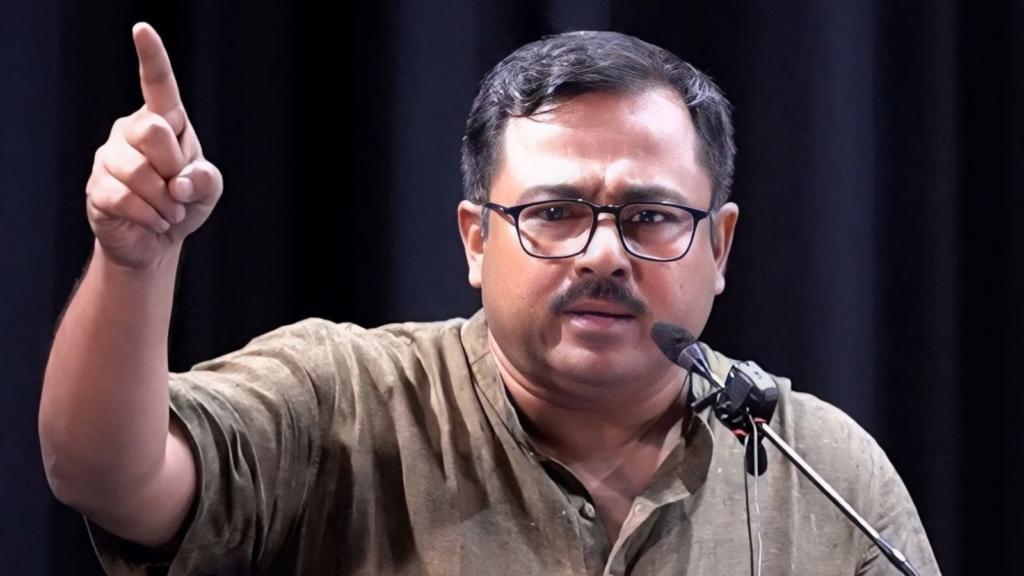In 2000, the RSS-affiliated Akhil Bharatiya Vidyarthi Parishad (ABVP) won the Jawaharlal Nehru University Students’ Union (JNUSU) presidential election by a single vote, when Sandeep Mahapatra narrowly defeated Vijoo Krishnan of the CPI(M)-backed Students’ Federation of India (SFI). That first — and so far last — ABVP victory for the top JNUSU post was made possible by a rift between two SFI leaders: Prasenjit Bose and Syed Naseer Hussain.
Hussain, a former JNUSU president from the SFI, quit the organisation to join the Congress and is now a Rajya Sabha MP close to party president Mallikarjun Kharge. On Monday, he is expected to welcome his old rival Bose into the party in Kolkata, more than two decades after their campus clash altered JNU’s political history.
Bose was among the best-known strategists of the SFI from the mid-1990s to early 2000s, often considered more powerful than its electoral faces. An Economics student, he earned a reputation for sharp political thinking and was even acknowledged by his ABVP rivals as the “brain behind the SFI”.
By 2012, Bose was heading the research unit of the CPI(M) when he quit in protest against the party’s decision to support the Congress-led UPA’s presidential nominee Pranab Mukherjee. The next day, the CPI(M) expelled him. For more than a decade, he stayed out of party politics.
Bose’s criticism of the Congress was harsh. In a 2014 piece in the website Kafila, Bose argued, “Being in power at the Centre for a decade, the Congress has done everything possible to discredit itself and alienate the people. Whatever little redistribution of resources was attempted through the NREGA, Food Security Bill, etc was more than undone through the relentless rise in food and fuel prices under Congress rule, which hit the poor the hardest. The erroneous policy of hiking interest rates to curb inflation failed to check rising prices and choked off investment and economic activity instead.”
“Most disturbingly, the Congress regime became synonymous with brazen cronyism and plunder of natural resources by a nexus of corrupt ministers, bureaucrats and big corporates. In more ways than one, it was the Congress which paved the way for the BJP,” read the article.
Now, in a political turn of events, Bose claimed he was joining the Congress to “contribute to the national movement to defend the Constitution and the right to vote” led by Leader of Opposition Rahul Gandhi. “The Congress has a major role to play in breaking the polarisation between the ruling Trinamool Congress (TMC) and the BJP in West Bengal,” he told The Indian Express.
On Sunday, he wrote on Facebook: “I have decided to join the Indian National Congress in West Bengal on Monday, September 15, along with fellow activists. Our immediate objective is to strengthen the democratic movement and rebuild progressive alternatives at the Centre and in West Bengal.”
Left student leaders in Congress
Bose’s shift adds him to a long list of Communist student leaders who eventually joined the Congress, despite JNU’s reputation as a Left stronghold. At least eight former JNUSU presidents from Left organisations have moved to the Congress over the decades.
The first was D P Tripathi, SFI leader and JNUSU president in 1975–76, who later joined the Congress before moving to the Nationalist Congress Party in 1999. Shakeel Ahmad Khan, JNUSU president from the SFI in 1992–93, also crossed over, as did Battilal Bairwa, who led the JNUSU from 1996 to 1998. Hussain, JNUSU president in 1999–2000, later joined the Congress and is now a Rajya Sabha MP.
Kanhaiya Kumar, JNUSU president in 2015–16 from the CPI-backed All India Students’ Federation (AISF), also switched to the Congress. The trend has been visible within the radical Left too. Three former presidents from the CPI(ML)L-backed All India Students’ Association (AISA) — Sandeep Singh (2007–08), Akbar Chaudhary (2013–14) and Mohit Pandey (2016–17) — later joined the Congress.
The steady stream of ex-Left leaders trickling into the Congress has not sat well with a section of the party’s own student wing, the National Students’ Union of India (NSUI). While NSUI veterans such as former Haryana Congress president Ashok Tanwar and AICC national secretary Chandan Yadav remain active, there is a perception that leaders from Left organisations who switch sides receive more prominence.
Tanwar himself quit after a rift with former Haryana CM Bhupinder Singh Hooda and briefly moved through the TMC, the AAP, and the BJP before returning to the Congress last year ahead of the Haryana Assembly polls. Still, disquiet persists within the NSUI over Communist leaders gaining quicker elevation within the party hierarchy.
Not all JNU Left leaders have changed sides. Krishnan, who narrowly lost the 2000 presidential election, remains a key CPI(M) leader today. Ginu Zachariah Oomen, another former student leader from the JNU, chairs the Kerala State Food Commission and continues in Left politics.
Reacting to Bose’s move, CPI(M) Politburo member Brinda Karat said, “I do not want to comment on an individual’s political choice since he was expelled from the party for publicly opposing our support to Pranab Mukherjee, the UPA’s presidential candidate.”
For Bose, joining the Congress marks a full circle in more ways than one. The strategist once central to the SFI’s dominance in JNU now seeks to shape a political alternative through the very party he once denounced.

